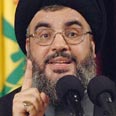
On July 12th of last year, Hizbullah's secretary-general arrogantly announced that two IDF soldiers had been taken captive by his organization. Since then, before every microphone and camera, he invariably mentions that he struck at the Zionist entity again and achieved a "divine victory" where Arab armies were previously repeatedly defeated.
When it comes to his image in the media at least, it appeared that Hassan Nasrallah had the upper hand in the war: His posters became popular in the Arab world, while streets, children, and even fruit species were named after him. Could all of that been just a false impression?
A year later, we can see that if something changed in Lebanon, it is apparently Nasrallah himself who changed. In fact, the moment the extent of Israel's response became clear, he started conveying signs of distress.
"We're talking about an American-Zionist plot that was planned in advance for autumn – and now they're using the opportunity for aggression against us," he said, while almost begging: "Believe me." Yet the credibility, possibly Nasrallah's major weapon, which he made sure to maintain through launching "surprises" throughout the war, continued to crack.
Ever since it became clear this was a war – a direct confrontation between Israel and him, and him alone – he appeared pale and confused. His explanations to the Shiite population, which paid a heavy price, were inconsistent, and some lacked any logic (he was slammed by some in Lebanon: After all, if he knew about the "plot," why did he play into their hands and carry out the abduction?)
Because of this, and possibly inadvertently, he admitted he made a mistake. In the first interview he granted following the war, he declared in an apologizing tone: "If we estimated there was even one percent chance that the abduction would lead to a war of such scope, we wouldn’t have carried it out."
Again and again he had to ask for forgiveness – from the Shiites, the Lebanese, and even Haifa's Arabs and the family hurt in Nazareth.
Yet Nasrallah's trouble did not end there. Immediately after he agreed to the ceasefire conditions, including the deployment of UNIFIL and Lebanese troops in the south – where he was the sole master until then – Nasrallah turned to celebrate the "divine victory" in Beirut's Dahiya neighborhood. He directed his arrows at the Siniora government in an attempt to stage a coup.
Coup attempt fails
Today we can say that the move failed: His masses of activists and loyalists, thousands of whom were sent to stay at the Riyadh al-Solh square until the government was toppled (according to some reports, some protesters received $20 a day for this "popular protest"), soon abandoned the tent city.
Siniora only grew stronger and is now engaged in a determined fight pitting his army (the same army Nasrallah claimed is unable to defend Lebanon) against the Fatah al-Islam armed militia.
The latest crisis again showed Nasrallah the limits of his influence: First he threatened that if the Lebanese army dares enter Palestinian refugee camp Nahr al-Barid, it would constitute the crossing of a "red line." Yet the army entered – and Nasrallah? He did not do a thing.
Now he is betting on another political move: Establishing a parallel government to Siniora's government. Yet nobody is scared. The anti-Syrian camp tells him: Mister, we are not a second Gaza; we won't have a second government here.
And what about the rehabilitation Hizbullah promised residents of the south? The organization left behind a bitter and angry Shiite population that would be difficult to appease. Many moved to meager surroundings in Beirut or other locations and were left with no trace of their homes, their fields, or the compensation they were promised.
Such sequence of mistakes certainly does not help someone who begs his listeners: "Believe me!" This year, his patrons (and apparently Nasrallah himself) discovered that this charismatic man is not necessarily good at predicting Israel's moves or reading the map within his own country.
In the coming days he will likely deliver speeches and continue to make note of events in Israel as an indication of his victory. Yet a year after the war, the man who was considered the Middle East's "wunderkind" and overshadowed regional leaders looks paler than ever, and is barely seen in public in fact.
He is indeed rearming quickly, and may embark on another war. Yet we can say about him what has been said of others before him: The magic is gone.
Roee Nahmias covers Lebanon and the Arab world for Ynet















